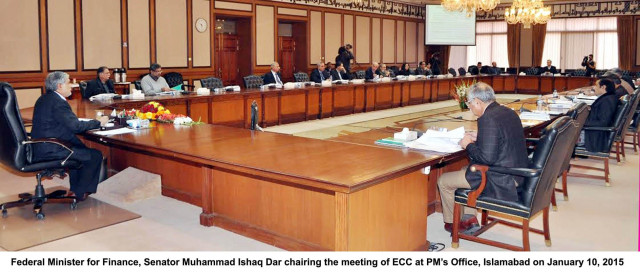Chronic power crisis: Govt decides to revive three RPPs
Move aims to add roughly 260MW to national grid

Finance Minister Ishaq Dar chairing ECC meeting in Islamabad on Saturday. PHOTO: PID
In an attempt to mitigate the chronic energy crisis in the short term, the government on Saturday greenlighted a proposal to revive three rental power plants (RPPs) which were shelved during the tenure of the Pakistan Peoples Party government.
The Economic Coordination Committee (ECC) of the Cabinet, in a meeting chaired by Finance Minister Ishaq Dar, approved the “utilisation of existing available generation capacity policy for short term independent power producers (IPPs),” a handout issued by the finance ministry said, and waived off 5% customs duties on these RPPs.
The move to revive RPPs is aimed at adding roughly 260 megawatts of electricity generated through residual fuel oil to the national grid. The government plans to purchase electricity from these RPPs for the next three years.
In order to avoid public criticism, the Pakistan Muslim League-Nawaz government has rebranded RPPs as ‘short-term IPPs’. It has maintained that the policy to revive the plants will not contravene the March 30, 2012 judgement of the Supreme Court which had struck down the PPP government’s RPP policy.
Interestingly, the author of the policy to revive the RPPs is Water and Power Minister Khawaja Muhammad Asif who had filed a case against the plants in the Supreme Court during the PPP’s tenure, alleging corruption.

Although the government has not officially disclosed the names of the three RPPs to be revived, an official of the water and power ministry said these would be the 100MW Techno Power Plant, 90MW Reshma Power Plant and 70MW Gulf Power Plant.
The government said the new arrangement with the RPPs is based on a ‘take and pay’ basis. This will not create any obligation for the government to pay for capacity or any other charges.
The ECC also approved the issuance of sovereign guarantee for a Rs25 billion syndicated term finance facility for the power sector, aimed at retiring the circular debt of the IPPs. Interest on the loan will be recovered from electricity consumers through a 30 paisa per unit surcharge in bills. The tenure of the facility is five years with a two-year grace period.
Duties imposed on steel products, cellphones
The ECC also imposed a 15% regulatory duty on the import of steel products, billets, bars and wire rods, 5% regulatory duty on cold rolled coils and galvanised platted sheets, and Rs200 per set duty on cellphones, the finance ministry handout said.
The government aims to generate Rs2.5 billion for the current fiscal year through the measures, an official of the Federal Board of Revenue (FBR) said.
It is the second time in less than a month that the government has taken budgetary measures aimed at recovering the shortfall in tax revenues. Last month, it imposed an additional 5% sales tax on all petroleum products.
The finance ministry claims the regulatory duties will boost the local industry and curb dumping. It said local manufacturers had demanded tariff protection and the imposition of regulatory duties. The duty on cellphones similarly aims to discourage under invoicing, the ministry added.
North-South gas pipeline approved
The ECC approved in principle the north-south gas pipeline under a ‘government-to-government arrangement’ with China which will provide a loan for the project. Although the final price tag has not been assessed yet, rough estimates suggest it will cost at least $1.7 billion.
The project is capable of transporting up to two billion cubic feet of gas from Karachi to mid country. The pipeline will not only help transport imported LNG but also give transport capabilities for the Iran-Pakistan and Turkmenistan–Afghanistan–Pakistan–India gas pipeline projects which are expected to come on line in the next three to five years.
The Inter State Gas System (Pvt) Ltd has been designated as the executing agency to implement the project under the government-to-government arrangement. The ECC also approved allocation of gas from the Ayesha gas field to the Sui Southern Gas Company.
Published in The Express Tribune, January 11th, 2015.




1733130350-0/Untitled-design-(76)1733130350-0-208x130.webp)













COMMENTS
Comments are moderated and generally will be posted if they are on-topic and not abusive.
For more information, please see our Comments FAQ